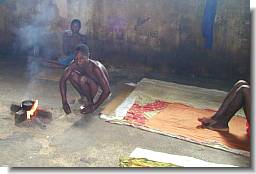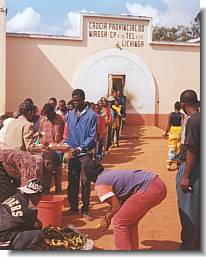|

|
Life
in prison
 The
majority of the prisoners in the jails of Mozambique - 60% according to
the Justice Department - are young people no older than 25. 39% is between
16 and 18 years old. They come from the poorest areas, the suburbs of the
cities or the forest villages. More than half of them are in prison for
"minimum crimes", small larceny. The
majority of the prisoners in the jails of Mozambique - 60% according to
the Justice Department - are young people no older than 25. 39% is between
16 and 18 years old. They come from the poorest areas, the suburbs of the
cities or the forest villages. More than half of them are in prison for
"minimum crimes", small larceny.
Many
have no clothes and are forced to wear the same set for months. They sleep
on the floor, only the luckiest have a mat to sleep on.
 Soap is a luxury that they receive only once or twice a year.
Soap is a luxury that they receive only once or twice a year.
The
amount of food they receive is scarce. It's normal to eat only once a day:
usually a plate of sweet corn pudding, often with no salt or oil. If one's
family lives far or if it's too poor to bring clothes or food, one runs
the risk of severe under-nourishment. Hygienic conditions are very bad as
well.
|
To
Fall sick in jail  Life
in jail heavily undermines one's health. Under-nourishment is a
first and immediate cause of the weakening of one's body and so it
also opens the way to many kinds of illnesses. But also the lack of
room and of adequate hygienic conditions facilitate the upcoming of
severe pathologies, tuberculosis, cholera, which often bring to
death. Life
in jail heavily undermines one's health. Under-nourishment is a
first and immediate cause of the weakening of one's body and so it
also opens the way to many kinds of illnesses. But also the lack of
room and of adequate hygienic conditions facilitate the upcoming of
severe pathologies, tuberculosis, cholera, which often bring to
death.
So,
for a small crime one risks one's life. Freedom, at the right time,
doesn't only mean to improve one's existence, often it means to save
it.
|
|
Help
programs in prison
In
many cities of Mozambique, like Pemba, Lichinga, Cuamba, Quelimane, Beira,
the local Communities of Sant'Egidio have been present in the jails for
over five years. They endeavour to improve the life conditions of the
prisoners, to guarantee and promote the respect of human rights, they
undertake formation and rehabilitation projects, to prevent people from
returning to jail. But they also try to assure the fundamental rights of
every man and every woman, to guarantee one's survival and one's dignity:
to eat , to be dressed, to take care of one's hygienic conditions.
The work of the Community is on several levels:
1. human
rights:
The presence in the prisons, the visit
to the prisoners, is the first, important action to protect
human rights. It reveals any violations and the most urgent needs of the
prisoners, it also gives the chance to support a legal action wherever
there is need of it. It isn't rare to discover that, because of their
poverty, some of the prisoners stay in jail "forgotten",
sometimes for years, waiting for judgement or after their term has already
expired, because of the lack of any legal tutelage. The action of the
Community of Sant'Egidio has revealed hundreds of similar cases and given
the chance to help.
2.
Formation and advancement:
Another fundamental right is that to personal dignity and personal
advancement. For this reason the Community of Sant'Egidio organises the
following courses:
- literacy courses, which end with a primary level state exam;
- professional courses for shoemakers, stuffers, carpenters,
zinc-workers, clay-workers. This professional
formation prepares the prisoners to re-enter society once they have served
their sentence.
3.
food aid:
 Under-nourishment and malnutrition represent an extra punishment, a
surplus of injustice. Food in fact is the first right to support,
fundamental for the survival of the person. That is why, in many African
prisons, the Community of Sant'Egidio visits the prisoners regularly
bringing them food. This kind of help, which at the beginning was
connected to the Easter and Christmas celebrations, has now become a
regular activity which reaches thousands of people.
Under-nourishment and malnutrition represent an extra punishment, a
surplus of injustice. Food in fact is the first right to support,
fundamental for the survival of the person. That is why, in many African
prisons, the Community of Sant'Egidio visits the prisoners regularly
bringing them food. This kind of help, which at the beginning was
connected to the Easter and Christmas celebrations, has now become a
regular activity which reaches thousands of people.
4. sanitary aid:
Together with the food, the right to one's health, thanks to decent
hygienic conditions and assuring the possibility of being cured is another
unalienable right. The Community endeavours to improve the health
conditions of the prisoners by means of some small projects. In some
prisons it was possible to promote structural interventions: That is how
two "Postos de sa�de", two small hospitals, were built in the
prisons of Lichinga and Cuamba, counting 17 places together;
- more than 12 latrines were restored together with the whole water;
- tanks have been installed to collect water.
|
